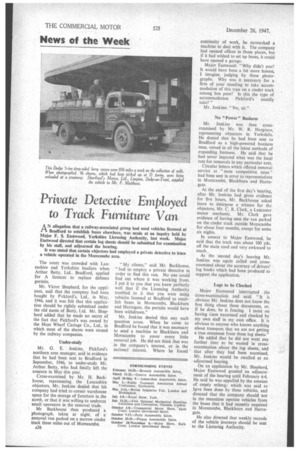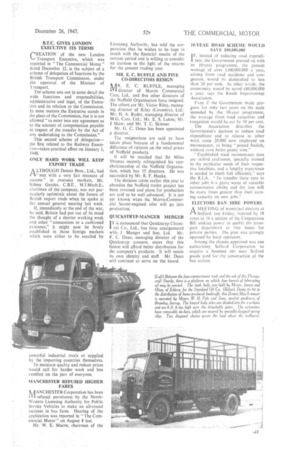Private Detective Employed to Track Furniture Van
Page 28

Page 29

If you've noticed an error in this article please click here to report it so we can fix it.
AN allegation that a railway-associated group had used vehicles licensed at Bradford to establish bases elsewhere, was made at an inquiry held by Major F. S. Eastwood, Yorkshire Licensing Authority, last week. Major Eastwood directed that certain log sheets should be submitted for examination by his staff, and adjourned the hearing.
It was stated that certain objectors had employed a private detective to trace a vehicle operated in the Morecambe area.
The court was crowded with Lancashire and Yorkshire hauliers when Arthur Batty, Ltd.. Bradford, applied for A licences to replace defence permits.
Mr. Victor Shepherd, for the applicant, said that the company had been bought by Picktord's, Ltd., in May, 1946, and it was felt that this application should be rightly submitted under the old name of Batty, Ltd. Mr. Shepherd added that he made no secret of the fact that Pickford's was owned by the Hays Wharf Cartage Co., Ltd., in which most of the shares were owned by the railway companies.
Under-study
Mr. G. E. Jenkins, Pickford's northern area manager, said in evidence that he had been sent to Bradford In September, 1946, to under-study Mr. Arthur Batty, who had finally left the concern in May this year.
Cross-examined by Mr. H. Backhouse, representing the Lancashire objectors, Mr. Jenkins denied that his company had tried to corner warehouse space for the storage of furniture in the north, or that it was willing to undercut small operators in the removal trade.
Mr Backhouse then produced a photograph, taken at night, of • a: removal van parked on a narrow cinder track three miles out of Morecambe.
A26
"My clients," said Mr. Backhouse, "had to employ a private detective in order to find this van. No one could find out where it was working from. I put it to you that you knew perfectly well that if the Licensing Authority tumbled to it that you were using vehicles licensed at Bradford to establish bases in Morecambe, Blackburn and Harrogate, the permits would have been withdrawn."
Mr. Jenkins denied that any such question arose. When he came to Bradford he found that it was necessary to send a machine to Blackburn and Morecambe to cover every little removal job. He did not think that was in the company's interest, or in the national interest. Where he found continuity of work, he earmarked a machine to deal with it. The company had opened offices in those places, but if it had wished to set up bases, it could have opened a garage.
Major Eastwood: "Why didn't you? It would have been a bit more honest, I imagine, judging by these photographs. Why was it necessary for a firm of your standing to take accommodation of this type on a cinder track among hen pens? Is this the type of accommodation Pickford's usually take? "
Mr. Jenkins: " No, sir."
No " Power " Business Mr. Jenkins was then crossexamined by Mr. W. R. Hargrave, representing objectors in Yorkshire. He denied that he had been sent to Bradford as a high-powered business man, versed in all the latest methods of expanding business. He said that he had never inquired what was the local rate for removals in any particular area.
Circular letters which offered removal service at "most competitive rates " had been sent in error to representatives in Morecambe, Blackburn and Harrogate.
At the end of the first day's hearing, after Mr. Jenkins had given evidence for five hours, Mr. Backhouse asked leave to interpose a witness for thz objectors, Mr. C. R. Clark, a Lancaster motor mechanic. Mr. Clark gave evidence of having seen the van parked on the cinder track outside Morecambe for about four months, except for some six nights.
In answer to Major Eastwood, he said that the track was about 100 yds. off the main road and very awkward to reach.
At the second day's hearing Mr. Jenkins was again called and crossexamined about the accuracy of drivers' 1g books which had been produced to support the application.
Logs to be Checked
Major Eastwood interrupted the cross-examination and said "It is obvious Mr. Jenkins does not know the first thing about these documents, or, if he does, he is fencing. I insist on having them examined and checked by my own staff in my own office. It is obvious to anyone who knows anything about transport that we are not getting a true statement from these log sheets."
He added that he did not want any further time to be wasted in crossexamination about the log sheets, and that after they had been examined, Mr. Jenkins would be recalled at an adjourned hearing.
On an application by Mr. Shepherd, Major Eastwood granted an adjournment of the hearing until February 4-6. He said he was appalled by the amount of empty mileag..: which was said to have been done by these vehicles, and directed that the company should not in the meantime operate vehicles from the bases that it had recently acquired in Morecambe, Blackburn and Harrogate.
He also directed that weekly records of the vehicle journeys should be sent to the Licensing Authority.
B.T.C. GIVES LONDON EXECUTIVE ITS TERMS
CREATION of the new London '••■• Transport Executive, which was reported in "The Commercial Motor" dated December 12, is the subject of a scheme of delegation of functions by the British Transport Commission, under the approval of the Minister of Transport.
The scheme sets out in some detail the wide functions and responsibilities, administrative and legal, of the Executive and its relation to the Commission. In most matters the Executive stands in the place of the Commission, but it is not allowed "to enter into any agreement as to the amount of compensation payable in respect of the transfer by the Act of any undertaking to the Commission."
This second scheme of delegation— the first related to the Railway Executive—takes practical effect on January 1, 1948. '
ONLY HARD WORK WILL KEEP EXPORT TRADE
A LTHOUGH DennisBros., Ltd., had .1-A" met with a very fair measure of success" in overseas markets, Mr. Sidney Garcke, C.B.E., M.I.Mech.E., chairman of the company, was not particularly optimistic about the future of British export trade when he spoke at the annual general meeting last week.
If, immediately at the end of the war, he said, Britain had put out of its mind the thought of a shorter working week and other "concessions to a cushioned existence," it might now be firmly established in those foreign markets which were either to be assailed by Licensing Authority, has told the corporation that he wishes to be kept in touch with the financial results of the current period and is willing to consider an increase in the light of the returns for the present trading year.
MR. E. C. RUFFLE AND FIVE CO-DIRECTORS RESIGN
1‘ AR E. C. RUFFLE, managing 1V1 director of Morris Commercial Cars, Ltd., and five other directors of the Nuffield Organisation have resigned. The others are Mr. Victor Riley, managing director of Riley (Coventry), Ltd.; Mr. H. A. Ryder, managing director of M.G. Cars, Ltd.; Mr. E. S. Lukes; Mr. I Shaw; and Mr. T. C. Skinner.
Mr. 0. C. Dono has been appointed a director.
The resignations are said to have taken place because of a fundamental difference of opinion on the retail prices of Nuffield products.
It will be recalled that Sir Miles Thomas recently relinquished his vicechairmanship of the Nuffield Organisation, which has 15 directors. He was succeeded by Mr. R. F. Hanks.
't he decision taken earlier this year to abandon the Nuffield trailer project has been reversed and plans for production are said to be well advanced, It is not yet known when the Morris-Commercial Saurer-engined oiler will go into production.
QUICKSTRYP-MANGER MERGER
I T is announced that Quickstryp Chemi cal Co., Ltd., has been amalgamated with J. Manger and Son, Ltd. Mr. F. C. Dean, managing director of the Quickstryp concern, states that this fusion will afford better distribution for the company's products. It will retain its own identity and staff. Mr. Dean will continue to serve on the board. 10-YEAR ROAD SCHEME WOULD SAVE £80,000,000 IF, instead of reducing road expendi1 ture, the Government pressed on with its 10-year programme, the present wastage of over £100,000,000 a year, arising from road accidents and congestion, would be diminished to less than 20 per cent. In other •words, the community would be saved f.;80,000,000 a year, says the Roads Improvement Association.
Even if the Government made progress for only two years on the scale intended by the 10-year programme, the wastage front road casualties and congestion would he cut by 50 per cent.
The Association describes the Governments decision to reduce road expenditure and to release to other work some 20,000 now employed on maintenance, as being "pound foolish, without even being penny wise."
" Established road maintenance men. are skilled craftsmen, specially trained in the particular needs of their respective localities, and a lengthy experience is needed to reach full efficiency," says the R.I.A. " To transfer these men to other jobs is a grave waste of valuable remunerative ability and the loss will be many times greater than their earning capacity on new jobs."
ELECTORS BAN HIRE POWERS
A MEETING of municipal electors at
Salford, last Friday, rejected by 18 voles to 16 a section of thc Corporation Bill seeking power to enable the transport department to hire buses for private parties. The plan was strongly opposed by local operators.
Among the clauses approved was one authorizing Salford Corporation to acquire a bombed site near Salford goods yard for the construction of the bus station.












































































